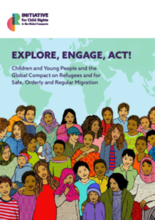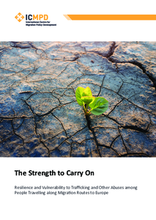Displaying 361 - 370 of 839
This publication is aimed at children and young people (and adults too!) so that they know what the governments of the world have said they will do. As the Global Compacts can be difficult to read, this ‘child and youth friendly’ briefing summarizes what these documents say about migrant and refugee children and young people.
This study analyses the incidence of human trafficking among people travelling along the ‘Eastern Mediterranean route,’ the ‘Balkan route’ and the ‘Central Mediterranean route’; factors of resilience to human trafficking and other abuses; and factors of vulnerability to human trafficking and other abuses. The study reveals the particular vulnerability of unaccompanied minors to child exploitation and abduction and highlights key recommendations for addressing human trafficking along these routes.
This article presents a cross-sectional survey in 19 facilities for minor refugees in Bavaria, Germany, screening for posttraumatic stress symptoms (PTSS), depression, anxiety, externalizing behaviour, and post-migration factors.
The increase in the arrival of unaccompanied minors to Europe rises as a new challenge for the local authorities responsible for the reception. The comparison of two cross-border regions shows the possibility of transferring successful practices between European states.
This series of videos highlights Save the Children's work in Honduras, El Salvador and Mexico to protect migrant and returnee children.
The objective of this study was to test the associations between parent-child separation with telomere length (TL) and psychopathology during adolescence.
This study aimed to explore school bullying in LBC and examine the effectiveness of art therapy intervention for reducing bullying victimization affecting LBC in rural areas of China.
As increasing numbers of Unaccompanied Refugee Minors (URM) are arriving in Europe, there is a need to investigate which factors promote psychological resilience and improve their mental health. This review aims to identify preventive post settlement influences, including living arrangements, access to mental health services and effective treatments that may improve mental health outcomes.
This paper outlines a psychological skills group for unaccompanied asylum-seeking young people with a focus on cultural adaptations in the context of a UK mental health service.
Outlining developments with reference to relevant studies, this review characterizes the perspectives used to explore and understand the phenomenon of children being left behind in rural China by parents going to work in cities.



